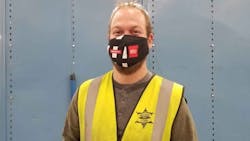All Denver RTD buses to have barriers as shield installation effort nears completion
Only a few dozen of Denver Regional Transportation District's (RTD) transit buses need to be equipped with see-through shields separating operators from the passenger aisle, which is now standard equipment for RTD's more than 900 bus fleet.
In RTD’s main body shop, a high-powered water jet has worked continuously for six months making cut after cut in large sheets of polycarbonate, building barriers to protect operators from COVID-19 while saving taxpayers thousands of dollars on each copy.
Four, two-person repair teams can each install three or four bus shields a day, says Andrew Merlino, senior equipment engineer for RTD. The agency estimates that more than two dozen people have devoted about 6,000 hours of labor to the project to date, including about 2,100 hours of overtime and not encompassing the engineering time expended to design and develop the parts.
The effort to equip close to 1,000 vehicles in RTD’s bus fleet with new pandemic protections was launched early in the summer, as ridership plummeted and operators were fearful of being exposed to infection from passengers passing close by each day. The agency at first priced pre-made shields offered by bus manufacturers and other suppliers, but quickly found the factory barriers would cost up to $5,000 each, Merlino says.
RTD engineers, managers and body shop maintenance employees thought they could craft their own for less money and with designs more adaptable to RTD’s multi-supplier fleet of buses. They ordered sheets of plexiglass and polycarbonate, which are cut with pattern-controlled water jets in order to avoid cracking or shattering.
Polycarbonate had less glare for drivers in road tests, so the designers continued to use that material. Engineers and machining employees scoured the shop for the right hinges, fasteners and other materials, and used the water jet cutter and other machines to custom-design more parts.
“It really saved the company a lot of money to do it this way,” Merlino said, putting the price per barrier at about $400.
Installation continues to be a balance between virus safety needs, driver desires and experience on the road, RTD officials say. At some angles and heights, the barriers can partially block sightlines or produce glare in mirrors at sunrise and sunset. Fastening systems loosen up during road jostling and need to be strengthened or tightened, Merlino says.
Moreover, the operators who like the barriers are now asking for more safeguards, saying the barriers could be extended or strengthened as a safety factor against assaults or other violence. RTD is considering those changes, but will first work to finish placing all the barriers on the remaining buses.
“It's a great success, and I think it's a better product than what the original equipment manufacturers are installing on the buses; it's more robust and offers more protection,” said Eric Castillo, assistant general superintendent of maintenance. “If you look at Andrew's work, I believe he's got the better product, all on his own.”
The shields are a response to concerns of both operators and passengers, as operators under normal boarding rules come into close contact with many passengers each day. RTD suspended fare collection and instituted rear-door boarding from April through July, returning to fare collection and front-door boarding as riders and operators adapted to the new pandemic reality.
RTD customers participating in a survey earlier this year said they were apprehensive about traveling by bus or train as the pandemic continues. The nearly 2,700 people who responded rated the use of RTD services as the least safe of six activities they might participate in, ahead of grocery shopping, visiting a drugstore or pharmacy, visiting friends or family and exercising outside.
The fabrication of bus shields supports previous in-house safety efforts during the pandemic, including the design and manufacturing of thousands of masks for operators and other employees on upholstery shop machinery. RTD staff have also gone to great lengths to secure backup supplies of personal protective equipment, sanitizing chemicals and other key items that have been in short supply during the pandemic.
